Methods for storing potatoes at home
Potatoes are one of the most frequent guests on our table. To eat quality vegetables all year round, it is important to preserve them properly. The harvest is not only kept in the cellar, but also in the apartment: in the hallway, pantry, on the balcony, kitchen and in the refrigerator.
To prevent the tubers from rotting and starting to germinate, they are provided with optimal conditions: temperature, humidity level and air circulation.
Timing for harvesting potatoes for winter storage
Only ripened tubers are stored well. Signal for harvest - drying of leaves. Experienced summer residents wait about a month until the tops are completely dry. Only dig up vegetables in sunny, dry weather to reduce the risk of rotting in the future.
Early varieties are harvested in late July - early August, mid-season varieties - until the end of summer, late varieties - from late August to the first weeks of September.
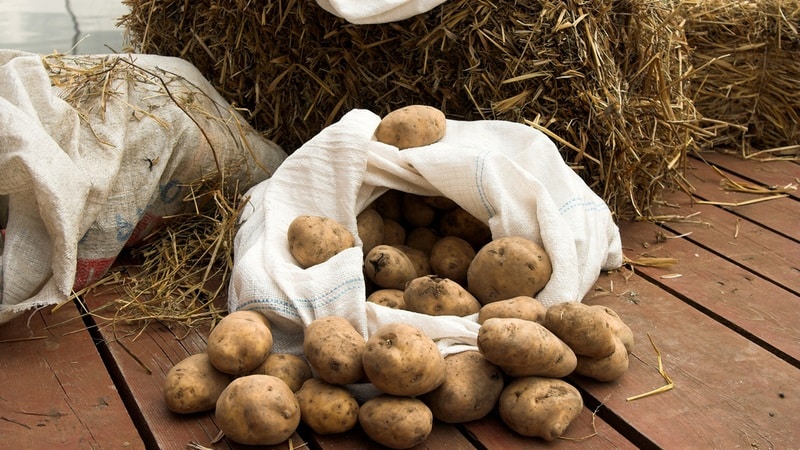
Preparation for storage
Preparing Potatoes is extremely important and consists of several stages:
- The dug up tubers are placed on a polyethylene flooring in one layer in the open air and dried for about a day. This will rid the supplies of microorganisms and remove excess moisture.
- The potatoes are finally cleared of soil and sorted. Separate specimens with mold, signs of insects, or mechanical damage from healthy tubers. Vegetables are also sorted by variety to take into account shelf life. Early crops are used first.
- The harvest is placed on film under a canopy and left to dry for another day.
After that vegetables are placed in boxes or bags for winter storage.
Optimal conditions
To ensure that potatoes are edible for as long as possible, the following conditions must be observed::
- check that pests (rats, mice, insects) did not enter the storage;
- create an optimal microclimate (+2...+4°C, 75–80% humidity);
- for storage choose wooden boxes with flooring, nets or canvas bags;
- sort the tubers once every 1–1.5 months.
Storing in the refrigerator or freezer
Although storing potatoes in the refrigerator is convenient and easy, it will not be possible to fit the entire crop on the shelves. In addition, low temperatures and condensation can have a detrimental effect on the taste of tubers.
How long
Shelf life of potatoes in a refrigerator small, 5–10 days. Therefore, it is better to place vegetables in small batches, 2-3 kg each. This amount is eaten in about 1.5 weeks.
In the freezer Fried and boiled vegetables last for 10–15 days, harvested whole or in strips for 3–6 months.
In any form
Raw potatoes are kept on special vegetable shelves for a week. The tubers are first checked for damage and cleared of soil.
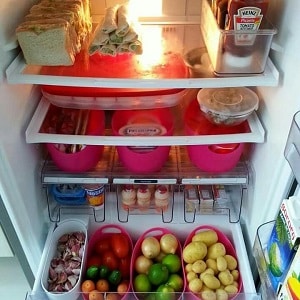 Peeled vegetables quickly darken when exposed to air. To keep the product fresh longer, do the following::
Peeled vegetables quickly darken when exposed to air. To keep the product fresh longer, do the following::
- The tubers are washed and then placed in a container with cold water. At room temperature, this will increase the shelf life of potatoes by 4 hours, in the refrigerator - by a day.
- Vegetables are washed and thoroughly dried with paper towels, placed in vacuum bags, tightly sealed and placed in the freezer.
Shelf life of boiled potatoes in the refrigerator - 3-4 days.
Important! The vegetable cannot be stored as part of other dishes for more than 2 days.
Why not
Although cold is the main assistant when storing food, It is detrimental to keeping potatoes for a long time:
- at low temperatures, starch turns into glucose and gives potatoes a sweetish taste;
- Condensation formed due to warm air causes vegetables to become damp and begin to rot.
How best to store
In the refrigerator, the tubers are kept on the bottom shelf for vegetables at a temperature of +5°C, boiled, fried and raw potatoes are stored in the freezer. Before being placed in the chamber, the vegetables are blanched, dipped in boiling water, and then in ice water, dried with paper towels and placed in containers.
By the way! To freeze fried potatoes, cool them completely and remove excess fat with napkins.
How to store potatoes in an apartment
In the absence of a cellar The harvest is kept until spring and at home.
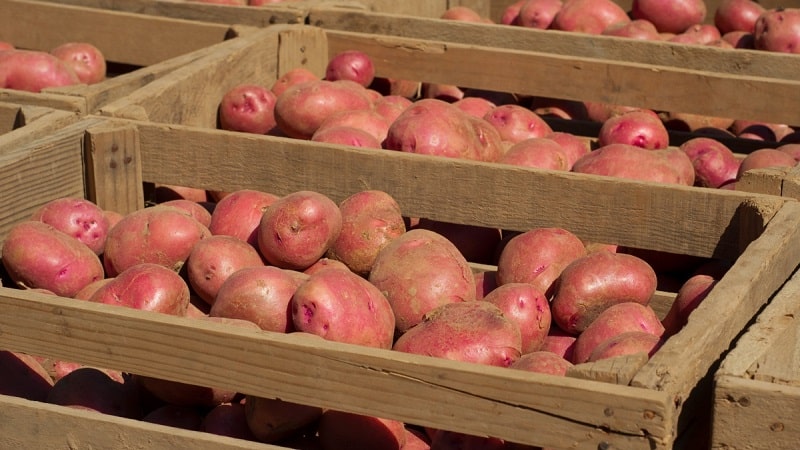
In the corridor
Although storing potatoes in an apartment allows you to always have access to the crop, it is complicated by some problems.
The temperature in the corridor is constantly changing, supplies suffer from the cold air, which is admitted when the door is opened. Vegetables are threatened by dirt and water from shoes and umbrellas.
In such conditions, the optimal level of humidity is monitored (75–80%). To prevent the tubers from fogging up and to keep them clean, they are covered with burlap. If the apartment is hot, place a container of water next to the crop.
At the entrance
The entrance of an apartment building allows you to store large volumes of potatoes, but the first danger of such conditions is the people living nearby. To prevent anyone from stealing supplies, the box with them is locked and secured to the floor.
Important! In winter, emergency situations often arise at the entrance: sewerage leaks, pipes burst. This negatively affects the quality of the tubers.
At room temperature
Room temperature is not suitable for long-term storage of potatoes: it is much higher than the optimal +2..+4°C, so the tubers rot, dry out or sprout. The shelf life of vegetables in such conditions is 10–14 days.
In the pantry
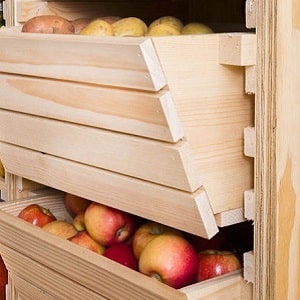 How to store potatoes in an apartment for the winter? Pantry is the best option: a constant climate is maintained here, the sun's rays do not enter the room.
How to store potatoes in an apartment for the winter? Pantry is the best option: a constant climate is maintained here, the sun's rays do not enter the room.
Tubers do not germinate, do not turn green and do not rot. Keep the harvest in wooden boxes with holes or mesh for sufficient air circulation.
If the air in the pantry is too dry, increase the humidity to 75–80% with a spray bottle, a damp cloth or an open bottle of water left indoors.
In the kitchen
Due to the small kitchen area, vegetables are often kept under the sink. The main advantage of this method is that the potatoes will be in close proximity to the cooking area. However, if the plumbing is faulty and condensation accumulates under the sink, the tubers will quickly rot. Pests also spoil the crop.
Important! The space under the sink should be well ventilated.
Vegetables put in wicker baskets or wooden boxes with holes.
On the balcony
The balcony is a common place to store potatoes at home. Large boxes of vegetables are placed here, and the relatively constant temperature allows the tubers to remain fresh until spring.
Choosing a balcony
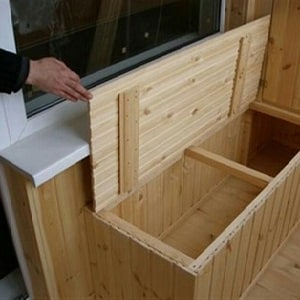 Even on a glassed-in balcony it is often cold in winter, especially during January frosts, so a heated room is better suited. The presence of temperature sensors will help create an optimal microclimate for the tubers (+2…+4°C).
Even on a glassed-in balcony it is often cold in winter, especially during January frosts, so a heated room is better suited. The presence of temperature sensors will help create an optimal microclimate for the tubers (+2…+4°C).
Suitable conditions for harvest cannot be created on an open balcony without special tools and containers. - tubers will be affected by cold weather, so preference is given to a glazed space.
How long do potatoes last?
At suitable temperature, humidity and air circulation on the balcony the tubers will remain fresh until spring. If such conditions are not created, the potatoes will last about 1-2 months, until the first autumn showers.
How to extend storage
To keep potatoes fresh until spring, a number of conditions must be observed.:
- Maintain the temperature at +2..+4°C. At higher rates, vegetables will begin to sprout; at lower rates, they will freeze.
- Provide air humidity of 70–85%. This will prevent the tubers from rotting.
- Choose a room with good ventilation.
- They isolate the crop from exposure to light: due to direct sunlight, potatoes produce a toxic substance - solanine. Green tubers are immediately disposed of.
- The bottom of the storage is covered with sand. It will absorb excess moisture and prevent vegetables from rotting.
How to keep potatoes
How to properly store potatoes in an apartment? Depending on the conditions, vegetables are kept in boxes or mesh bags.
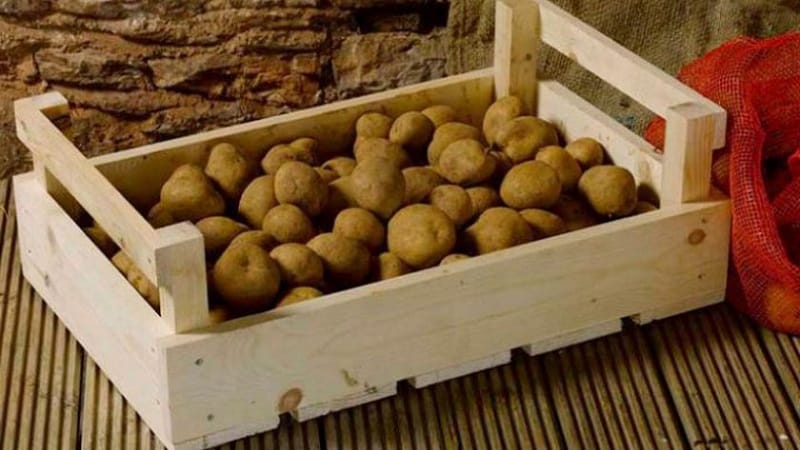
In wooden boxes
Boxes without heating are kept in an apartment, basement or on a glazed heated balcony. Such containers will provide the necessary ventilation, and the tree will not allow the tubers to become damp.
The box can be put together from scrap boards, old furniture, or purchased ready-made.
Healthy! Sometimes the container is insulated with polystyrene foam, foil or warm cloth, tightly closing all holes. This will protect the crop from cold snaps, but will reduce ventilation. To prevent vegetables from getting damp, they are sorted regularly.
For vegetables they sell special boxes with automatic temperature control. They are more expensive and require some work skills, but they are guaranteed to save supplies until spring.
In plastic boxes
Such containers are available and inexpensive, but do not contain holes for ventilation. Plastic is an artificial material that does not allow air or moisture to pass through., which creates a greenhouse effect.
To eliminate this drawback, make small holes in the walls of the box., sand is poured at the bottom or hay is placed.
Important! Such containers are not suitable for use on the street or in the entrance.
other methods
When stored in a warm barn or pantry use regular meshes.
Special backpacks are suitable for the balcony (thermal containers) of different volumes, equipped with foil insulation on the inside. This device is quite compact and allows you to store vegetables for a long time. Models are sold with temperature sensors and heating elements that will raise the temperature inside the backpack if supplies are kept on an unheated balcony.
Common Mistakes
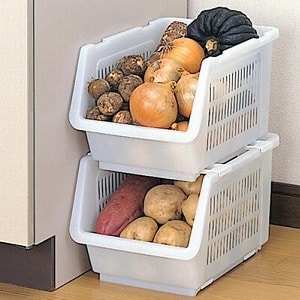
When storing potatoes at home and on the balcony make the following mistakes:
- The tubers are not sorted carefully enough. It is important to get rid of damaged specimens and use only whole and healthy ones.
- Hold potatoes along with others vegetables. The ideal neighbor for a vegetable is beets; they are laid out as a top layer to absorb excess moisture.
- Containers are not disinfected. To preserve the harvest, it is recommended to treat boxes and bags with a solution of potassium permanganate.
Recommendations
Tips to help keep potatoes fresh for a long time:
- place a few sprigs of mint or cloves in the box;
- insulate not with fabric, but with hay or straw;
- do not keep early and late varieties together: the former are not suitable for long-term storage in equipped boxes or bags;
- Spruce branches or wormwood located between the tubers will help against rot.
Conclusion
Keeping potatoes fresh for the winter is easy if you follow all the recommendations. It is best to keep vegetables in a cellar or basement, but with optimal humidity and temperature in a pantry or on a glazed, heated balcony, the tubers will not lose their quality until spring.